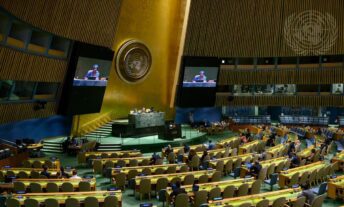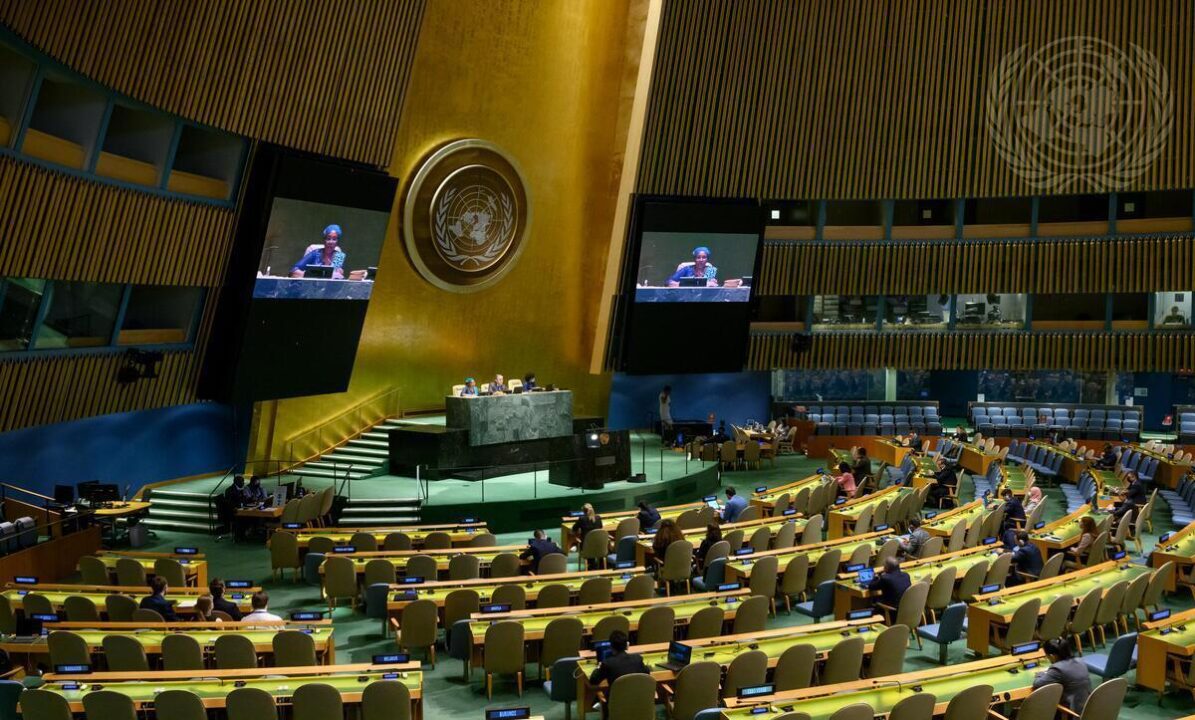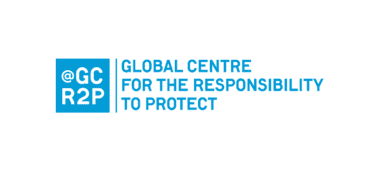

Summary of the 2022 UN General Assembly Plenary Meeting on the Responsibility to Protect
The UN General Assembly held a plenary meeting on the “Responsibility to Protect (R2P) and the prevention of genocide, war crimes, ethnic cleansing and crimes against humanity” on 23-24 June as part of the formal agenda of its 76th session. The debate constituted the fifth time that the General Assembly formally considered R2P. During the meeting, 61 UN member states, one observer mission and the European Union (EU) spoke on behalf of 91 countries.
This year’s debate was the first meeting since the General Assembly adopted Resolution 75/277 on 18 May 2021. With the adoption of this historic resolution – the first General Assembly resolution on R2P since 2009 – member states decided to include R2P on the annual agenda of the General Assembly and formally requested that the Secretary-General report annually on the topic.
BACKGROUND TO THE DEBATE
Paragraph 139 of the 2005 World Summit Outcome Document stressed “stress the need for the General Assembly to continue consideration of the responsibility to protect.” Since that time, the General Assembly has held eight informal interactive dialogues on R2P (2010-2017) and five debates (2009, 2018, 2019, 2021, 2022).
Each General Assembly meeting has been preceded by the publication of a Secretary-General’s report on R2P. Since 2009 the UN Secretary-General has released fourteen reports on R2P. This year’s report, entitled “The Responsibility to Protect: Prioritizing Children and Young People,” considers the vulnerabilities of children and young people in the context of genocide, war crimes, ethnic cleansing and crimes against humanity. The Secretary-General provides an overview of advances that have been made in protecting children and young people and recommendations on how to better protect them from these crimes.
PARTICIPATION OVERVIEW
H.E. Mr. Enrique A. Manalo, Vice-President of the 76th session of the General Assembly, opened the debate. Ms. Alice Nderitu, the UN Secretary-General’s Special Adviser on the Prevention of Genocide, delivered introductory remarks, underlining that since the 2005 World Summit, “Member States, the UN Secretariat and the General Assembly have made progress in further elaborating and operationalizing the Responsibility to Protect and have, among others, elaborated frameworks for identifying risks, early warning models and institutional mechanisms for implementation.” Reflecting upon the Secretary-General’s report on R2P and its recommendations, Ms. Nderitu emphasized that, “priority should be given to how implementation can be advanced in concrete and accountable terms to yield real measurable outcomes for children and youth and broader population groups.”
The opening remarks were followed by interventions from Costa Rica, on behalf of the Group of Friends of R2P; the EU, on behalf of its member states and Albania, Bosnia and Herzegovina, Georgia, Moldova and Ukraine; Estonia, on behalf of Latvia and Lithuania; Luxembourg, on behalf of the Netherlands and Belgium; Mexico, on behalf of France; and 57 additional member states and one observer mission, the Sovereign Order of Malta. Thirty members of the Group of Friends also made statements in their national capacity.
Greece and the observer mission the Sovereign Order of Malta spoke for the first time in an R2P debate or dialogue. Twelve of the states who have participated in all previous General Assembly discussions on R2P also made statements: Australia, Brazil, Canada, Costa Rica, Cuba, Iran, Mexico, Republic of Korea, Switzerland, United Kingdom, United States (US) and Venezuela.
KEY THEMES
The overwhelming majority of participating member states expressed their commitment to paragraphs 138 and 139 of the UN World Summit Outcome Document. While a small minority of states – including Cuba, Democratic People’s Republic of Korea, Iran, Syria and Venezuela – challenged the application of R2P, the discussion reflected widespread support for the norm.
The statement by the Group of Friends of R2P highlighted the valuable progress achieved by the UN, member states and other stakeholders, including civil society, in implementing R2P since its adoption in 2005. While acknowledging that the international community has fallen short in consistently and effectively responding to atrocities, the statement emphasized that R2P remains the key principle around which the international community can coalesce when vulnerable populations face the threat of genocide, war crimes, ethnic cleansing and crimes against humanity.
This year’s General Assembly debate took place amidst alarming levels of violence, atrocities and displacement. Despite efforts to prevent the escalation of conflicts and protect populations, there are currently more than 100 million people displaced by persecution, conflict, violence and human rights violations. Participants underscored the importance of strengthening domestic and international tools to prevent atrocity crimes and protect vulnerable populations amidst disregard for international law. Many states emphasized that translating early warning into early action remains a challenge, and highlighted ongoing crises in Myanmar, Ethiopia, Syria, Yemen and elsewhere. Many states (18 speakers on behalf of 23 countries) used this year’s plenary meeting to condemn the Russian Federation’s invasion of Ukraine in February and the subsequent mass atrocities committed against civilians.
Annual Report of the UN Secretary-General on the Responsibility to Protect
Forty speakers (on behalf of 77 countries) discussed the topic of this year’s Secretary-General’s report on R2P. Member states raised alarm about the unique risks children and youth face in atrocity situations, including killing, maiming, abduction and forced recruitment. Namibia expressed concern, stating that, “children and young people continue to be targeted by and caught up in atrocity crimes. The plight of children in situations of armed conflict, in particular, which has been extensively documented remains a serious concern.”
The importance of protecting children and young people was emphasized by several states, including the US who noted that, “when we work collectively to protect children, we are not just saving lives, but also safeguarding our future.” In this context, several states reflected upon the seven priorities the Secretary-General proposed to transform the protection of children and young people from atrocity crimes. Many states raised the important role education can play in building societies that are inclusive, tolerant, respectful of diversity and able to manage conflict by implementing national curricula that promotes understanding of others and teaches a balanced account of history. Italy stressed that, “a crucial role is played by education, which is the most powerful tool against hate, as it nurtures the ability to discern the truth, to be aware of fundamental rights, and to recognize, fight and report abuses, as a pre-condition to held the perpetrators accountable.”
While many states acknowledged the importance of the thematic nature of the annual reports on R2P, 10 speakers (on behalf of 61 countries) urged the Secretary-General to include risk assessments highlighting specific country situations and recommendations for effective response in future reports. Denmark stated that, “the report rightly mentions what atrocities affect children, and what measures States could take to address this. These crimes are real. They are being committed as we speak. But, the report does not identify where, making it a challenge to address these situations.”
Support for the Office of the UN Special Advisers on the Prevention of Genocide and the Responsibility to Protect
Seventy-two member states and the EU expressed support for the Office of the UN Special Advisers on Genocide Prevention and R2P. Namibia mentioned that the 2005 World Summit Outcome Document and the subsequent establishment of the office “filled a critical gap in the UN’s prevention and protection architecture.” Reaffirming their support for the Office’s contributions to early warning and prevention, the Group of Friends of R2P encouraged the two Special Advisers “to use their leadership roles to advance atrocity prevention and highlight risks in ongoing crises around the world,” including by issuing statements on specific country situations, sharing country analyses at various meetings with the wider UN membership, and to “regularly provide the necessary early warning assessments and recommendations on how to prevent atrocities, including to the Security Council, General Assembly and the Human Rights Council.” Germany also encouraged the Special Advisers to “make full use of their positions to advance atrocity prevention and highlight atrocity risks throughout the world.”
Accountability for mass atrocity crimes
Seventy-two states emphasized the need to ensure justice for victims of mass atrocity crimes. The Republic of Korea noted that, “accountability is a duty, not a choice. And it is one of the most effective ways to prevent the recurrence of such grave crimes.” Many states stressed the importance of strengthening national judicial systems and policies, improving judicial cooperation and advancing transitional justice to effectively contribute to the prevention of mass atrocities. “Strengthening accountability is both a critical deterrent for future perpetrators and a necessary response to atrocity crimes already committed,” according to the EU.
Participants stressed that international and hybrid courts and tribunals, as well as universal jurisdiction, can provide complementary avenues for holding states and individual perpetrators of genocide, war crimes and crimes against humanity accountable, with 68 states mentioning the importance of international institutions, such as the International Criminal Court and the International Court of Justice. The EU and several states also highlighted the accountability mechanisms adopted by the General Assembly and Human Rights Council.
Improving early warning mechanisms
The timely identification of risks and early warning indicators of atrocity crimes can help prevent their occurrence. During the debate, 65 member states emphasized the importance of bolstering early warning mechanisms at the national, regional and international level. Several member states shared best practices on early warning in domestic and regional contexts and described the different tools that have been developed and implemented. The EU discussed their toolkit on R2P and atrocity prevention, which provides practical guidance to EU delegations, missions and operations. In sharing the work of their National Peace Council, Ghana encouraged states to establish “national peace infrastructures as an early warning and response mechanism to atrocity crimes, especially in conflict prone and developing countries.”
Romania emphasized the need for improved early warning mechanisms, noting that, “violations of human rights and of fundamental freedoms often generate mass atrocities” and, therefore, the “Human Rights Council and its mechanisms play an essential role in providing early warning of the risk factors that can lead to mass atrocity crimes.” Sixty-two states amplified this by underlining the importance of the Human Rights Council and the Universal Periodic Review process in the context of early warning, atrocity prevention and R2P.
Some states also recognized that in many situations there is ample early warning, but little international response. France and Mexico noted that, “early warnings are of little use if we do not respond with appropriate and timely action.”
States also highlighted the significant role that civil society, media, religious and traditional leaders, and women and young people can play in developing early warning and response systems at the national level by raising awareness about human rights violations and possible atrocity crimes.
UN Security Council inaction
Sixty-five states expressed concern regarding ongoing UN Security Council (UNSC) inaction in situations where states have manifestly failed to uphold their responsibility to protect vulnerable populations. Amid growing criticism regarding the inability of the Council to respond to the Russian invasion of Ukraine, many states emphasized the need for UNSC reform and the restraint of veto powers in situations of mass atrocities. As noted by France and Mexico, “it is high time to raise our voices given the challenging times we are living in which multilateralism and international law are being put to a test” and that “the use of the veto cannot be aimed at paralyzing the Security Council in the fulfillment of its mandate to maintain international peace and security.” Sixty-five states mentioned various initiatives aimed at guiding the behavior of UNSC members in the case of mass atrocities, including the Accountability, Coherence and Transparency group’s Code of Conduct and the French-Mexican initiative on the use of veto. Fifty-nine states applauded the recent adoption of General Assembly Resolution 76/262 entitled, “Standing mandate for a General Assembly debate when a veto is cast in the Security Council.”
Many speakers, including the Group of Friends of R2P, also emphasized the need for the UNSC to strengthen and improve its response to early warning signs or to take timely and decisive action in cases of unfolding atrocities to prevent further escalation. The Republic of Korea urged the UNSC “to strengthen its efforts to deal with the risk or commission of mass atrocities.” In this context, Denmark called on members of the Council “to consult with the Office and to apply the UN Framework of Analysis for Atrocity Crimes to help identify the drivers of atrocity risks.” The Group of Friends of R2P stressed that, “the Security Council should consider situations where there is a potential for mass atrocities at the earliest stage possible, including through utilizing working methods such as situational awareness or horizon scanning briefings, Arria-Formula meetings, and by inviting the UN Special Advisers on the Prevention of Genocide and R2P as well as the High Commissioner for Human Rights to brief the Council.”
Cross-cutting issues
The linkages between R2P and the UN’s children and youth agendas were raised by many states in light of the topic of this year’s report on R2P. Many states also highlighted how R2P relates to other cross-cutting issues, including peacekeeping, the Protection of Civilians, the Women, Peace and Security agenda and the 2030 Agenda and Sustainable Development. In sharing best practices on linking cross-cutting issues, Italy mentioned their collaboration with the UN Department of Social and Economic Affairs on a multi-country initiative that aims to increase the capacities of governments and youth-led civil society organizations in the formulation, implementation and evaluation of effective national youth policies in the field of conflict prevention, peace-building and sustaining peace.
Several states also discussed how hunger can exacerbate conflict, as food shortages deepen existing grievances, fueling tensions that may incite violence. While stressing the importance of the Security Council’s condemnation of the use of starvation as a tactic of war, and recognizing the impact of armed conflict on food insecurity, Slovenia emphasized that a “long-term investment in development to break the cycle of hunger and conflict is essential,” including by ensuring long-term political solutions and strengthening sustainable food systems to protect them from future shocks.
France and Mexico also underlined that atrocity prevention “goes hand in hand with the achievement of the Sustainable Development Goals. In conflict settings, it is furthered through effective protection of civilians, including children and youth, and the strengthening of peacekeeping through the [Action for Peacekeeping] initiative.”
Hate speech and incitement
Incitement to violence, discrimination or hostility and hate speech and propaganda campaigns that target specific groups can create an environment that encourages the commission of atrocity crimes. Italy noted that, “mass atrocities and crimes find a fertile ground where hate is cultivated.” To mitigate this risk, Italy stressed the importance of building pluralistic and inclusive societies, including by strengthening civil society, and asserted that, “states have the main responsibility to address discrimination in all its form, prevent and fight hate speech, and value and manage diversity through effective legislation and targeted policies.”
Several states shared best practices for countering and preventing hate speech and inflammatory rhetoric. Ghana, for example, noted that over 600 youth journalists received training on conflict sensitivities, including hate speech and inflammatory language in the media, ahead of the 2020 presidential and parliamentary elections. Romania discussed the implementation of a National Strategy for preventing and combating anti-Semitism, xenophobia, radicalization and hate speech, as well as the appointment of a Task Force to monitor the implementation of the strategy.
CONCLUSION
The 2022 General Assembly plenary meeting featured diverse perspectives on how to overcome the challenges in implementing R2P and mobilizing collective action for the prevention of mass atrocities. While acknowledging that ongoing atrocities are a constant reminder of the gap that still exists between the promise and reality of R2P, states constructively discussed practical next steps to better uphold their individual and collective responsibility to protect. The continued overwhelming support for R2P as a standing item on the General Assembly’s Formal Agenda ensures further constructive debates and the sharing of best practices to prevent mass atrocity crimes for years to come.
